HIT CHANNEL EXCLUSIVE INTERVIEW: October 2024. We had the great honour to talk with a legendary guitarist: Andy Powell. He is best known as a founding member and guitarist of Wishbone Ash for 55 years. Their twin lead guitar sound and the iconic “Argus” (1972) album influenced bands such as Thin Lizzy, Iron Maiden, Judas Priest, The Eagles and others. Andy has also recorded with George Harrison and Ringo Starr of The Beatles. In 2020 Wishbone Ash released the latest studio album called “Coat of Arms”. Read below the very interesting things he told us:
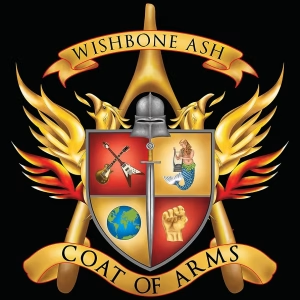 What should fans expect from your upcoming US tour?
What should fans expect from your upcoming US tour?
Well, we are calling it “The Wishlist Tour”. We ran a series of polls on the Internet, on our social media and we got a selection of songs that people would like to hear, so, we will play that selection or some of that selection. Obviously, some things that we want to play, but we are paying attention to what the fans want.
Could you please give us some basic information about the writing and recording process of “Coat of Arms” (2020) album?
So, it was a cool number of people involved initially and that was myself, Daniel Vetter, our sound man, who did the recording on the demos, Mark Abrahams (guitar) and my son, Aynsley Powell. The four of us went to Saint-Étienne, in France, we have a friend there who has a little demo and rehearsal studio and that’s where we started the process. We came down there for 10 days and we started to bring our ideas on to the table, that we had for the album. We started to make some simple demo recordings of the ideas and then we took those ideas to Lancashire in England, to the house of Joe Crabtree, who was our drummer at the time. He has a studio there called Cross Stix Studio and that’s where we recorded the tracks with the whole band, so, we got the band’s input. The writers were myself, Mark and Aynsley, really and Daniel was playing a little bit of bass and recording the demos. Then, after that, we had the basic tracks together and I brought the tracks back to my house here in Connecticut and that’s where I did the vocals and the guitar overdubs. Mark did the same thing in England and then it was mixed in New York (laughs). So, it moved around the planet a little bit.
I really like “It’s Only You I See” from “Coat of Arms” album. Please tell us a few words about this nice song.
Oh, ok. It’s a relationship song and in fact, we will probably play it on the next tour. I think it’s a mood style of music that we can sometimes play that people really like; they really like the mellow side of Wishbone Ash. The music just came together very naturally with myself and Mark. Some chords, some extra parts were added in England, but the song is really about somebody leaving you and how you will always remember the situation and you will always keep watch on that relationship as it moves forward, even though it’s broken up. Yes, it’s a very tender-hearted song.
In your opinion what makes the music of Wishbone Ash still relevant in 2024?
Dynamics, melody; it’s a very melodic band. We don’t rely solely on the guitar, even though it’s a guitar band. We are a twin lead guitar band, we were one of the first bands that started minding that scheme, but I think it’s still down to the songs. We try to put emotion and feeling into the songs and melody is a really key thing. The twin lead guitars helped to push the melodic content of the band forward, but we don’t rely on them for everything. It’s really about songs and music, to be honest with you.
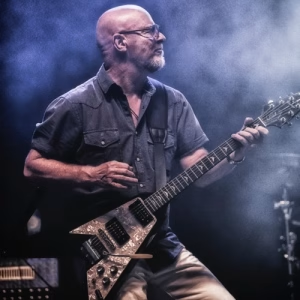 How much did the tour as opening act for Deep Purple in 1970 help the band?
How much did the tour as opening act for Deep Purple in 1970 help the band?
I don’t think that the music of Deep Purple really shaped the band, in any way, to be honest, but the chance meeting of myself and Ritchie Blackmore when we had that famous jam at the soundcheck, that was everything because that was instrumental in us achieving a record contract with an American recording company. And of course to sign to a recording company in America was very important because many English bands at the time were signing to record companies based in London or it might have been a subsidiary of a record company in America like Atlantic or whatever, but we went straight to LA and signed. That was important because it meant that the albums would be released all over the world: Greece, India, Finland, you name it and I don’t think that advantage was held by a lot of English bands. People don’t realise that people really get access to your music based on the fact that they can hold of the record. It’s not like now when you can just go on the Internet and get everything. So, there were only a few rock bands on that label (ed: MCA), at that time; actually, it was only three: Us, Elton John and The Who and it meant that our records went out around the world, just like those other artists. So, the meeting with Deep Purple was very important, although subsequently we toured with them a lot. We toured in South Africa, we toured a little bit in Europe with them and we know the guys and we come from a similar time frame in music, so I think that’s a common bond. I can’t say that we were particularly influenced by their music, although we did share the same record producer, that got them their first #1 hit, which was Derek Lawrence. He produced the song “Hush” (1968).
Tell us a bit about your jam with Ritchie Blackmore.
He was known to be quite difficult guy and he went on stage and started playing guitar, a lot of guitar, through this little Vox AC30 (ed: amplifier) and the rest of the band went off somewhere, to the dressing room and left him to it. Well, we already had our equipment set up behind, so I crept on stage and he would play a lick and I plugged my guitar in and I played the same lick, then he played another lick and I played the same lick. So, we had a “conversation”, and I think he thought it was quite cheeky, quite funny, you know and it was a really good jam, it was a fun thing to do. Afterwards, actually, he stood around and saw Wishbone Ash playing. He was the one who introduced us to Derek Lawrence and then Derek Lawrence introduced us to MCA/Universal in America.
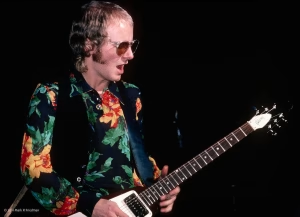 Please tell us everything we should know about the great song “Throw Down the Sword” from “Argus” (1972).
Please tell us everything we should know about the great song “Throw Down the Sword” from “Argus” (1972).
That’s a very popular song in Greece, right? The lyric was written by Martin Turner (ed: bass, vocals), it’s a great lyric. We were exploring the idea of war and slavery and how civilizations rise and fall and it always involves a war, so, we thought: “Why not do a song that involves after the war, the peace?” It’s really about throwing down the sword and making peace and questioning in a light way: “What is the point of all this and we always end up in the same situation? As civilizations rise, they fall”. So, it’s a very majestic song and it was written also from the standpoint that we needed slower songs. Up to that point our music was very fast and energetic and we needed slower songs that would translate better in a stadium. We were playing bigger halls in America and we needed songs that were more easy for audiences to get hold of and “Throw Down the Sword” was one of those songs; it’s very simple. It has a little folk melody in the beginning which was my idea; you can almost hear that in a Greek folk song or even an Irish folk song, it’s got that roots feel about it. Of course, the big thing in the end is the guitar solo and everyone says that is the greatest twin lead guitar solo ever by Wishbone Ash and it was two guitars (laughs), but it was two takes of me playing the same solo. It was our graphic designer who designed a lot of our album covers, Storm Thorgerson (Pink Floyd, Scorpions, Led Zeppelin) of Hipgnosis, he was in the studio at the time and we just said: “Storm, what do you think, which take is the best take?” and he said: “Both of them. Why don’t you just play both on the record?” We said: “Oh my goodness, that’s an interesting idea”, because we were trying to decide between two different takes. So, we put the two solos and the melodies interwove with each other. It was an exciting moment, it just sounded incredible! It was like musical poetry.
Are you proud that “Argus” (1972) is considered a classic album?
I agree with it. I mean, I always think our most recent album is the best and we ‘ve done some great albums, but “Argus” is the classic album of our career, no question about it. It’s my favourite, too.
Is it flattering that Wishbone Ash influenced bands such as Thin Lizzy, Iron Maiden, Judas Priest and others?
Yeah, it is flattering. There are several factors involved in that. Thin Lizzy, for sure, got their idea for the twin lead thing. They had a very charismatic frontman (ed: Phil Lynott -vocals, bass) and they wrote good pop/rock singles, which we weren’t really in the business of doing, so, that was the difference, but I know for a fact, I spoke to Scott Gorham (ed: Thin Lizzy -guitar) when Thin Lizzy came across from Ireland, the first show they came to was Wishbone Ash playing live at The London Lyceum Forum and Thin Lizzy turned to Phil Lynott and he said: “This is the sound we need”. So, I think it was very flattering that they chose our sound. Of course, with Judas Priest and Iron Maiden, the flying V at that time was not really a big rock guitar, so, it has become now an iconic guitar in metal and I think those guys decided that it was a cool look and a cool sound; the guitar fits that music. I know for a fact, even bands like Big Country, Simple Minds, I know Jim Kerr (ed: Simple Minds -vocals) used to come to our shows and see Wishbone Ash. So, the Celtic influence, the metal influence, it’s all there in our music. You can hear it in “Argus”, it’s there on every track. You can see that that is the seeds of something that became much-much bigger, even within other media like TV series, Netflix and HBO series like “Game of Thrones”. When you listen to the music for “Game of Thrones”, you think about this whole mystical imagery that “Argus” had. It’s become a genre and I think bands like Wishbone Ash were the beginnings of that fantasy genre, if you like, especially with the album “Argus”.
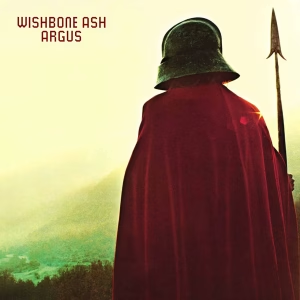 Could you imagine “Argus” without the artwork of Hipgnosis (Pink Floyd, Scorpions, Led Zeppelin)?
Could you imagine “Argus” without the artwork of Hipgnosis (Pink Floyd, Scorpions, Led Zeppelin)?
No, no! I think it was a moment in time where everyone’s imaginations were highly tuned and we were all on the same wavelength and especially the artwork of Hipgnosis, which added to it. Then, the best crowning glory was when Steve Upton (ed: drums) gave the album the title “Argus”. He saw the imagery of the warrior and we said: “How are we gonna call this” and he said: “It’s iconic. Just one word: ‘Argus’. The all-seeing, all-watching, all-powerful watcher of the world”. They often name newspapers, The Evening Argus or whatever. This sort of wild, weary, powerful watcher, a person who is not god, but he is looking over the human activity and thinking: “Oh my goodness!”
On “There’s the Rub” (1974) album you worked with Bill Szymczyk (The Eagles producer). Did your twin lead guitar sound influence “Hotel California” (1976)?
It did, I think. Yeah, unquestionably. As it has been recorded many times, we were the band in the studio with Bill directly before The Eagles came in. In fact, when we were packing up to take our equipment out of the studio, The Eagles were bringing their guitars in and I thought: “Oh my goodness, that’s a lot of guitars” (laughs). They all were gonna make this a guitar album and I think the work that we had done with Bill Szymczyk was instrumental in that inspiration for them. Also, some time before, Joe Walsh (ed: The James Gang –guitar) just joined The Eagles, but he came into the studio and Bill Szymczyk was saying to me and Laurie (ed: Wisefield -guitars, vocals) : “Do you think it would be a good idea to have three guitar players? This guy, Joe Walsh, is a good friend of mine” and we said: “No, that will never work” (laughs) and then the next thing he did, he joined The Eagles and the rest is history.
But I think there again, we were highly tuned to the FM radio airwaves in America and other bands in America could ‘ve been influenced a little bit by Wishbone Ash, as well. I think they were definitely listening to everything, like we were. They were listening to Rod Stewart, Eric Clapton, they were listening to country artists and the same for us. Everybody was listening to everybody and I mean, for example, I’ve mentioned this before, that the band Steely Dan, which is an incredible band, their song “Reelin’ in the Years” (1973) has a guitar lick, which is almost like the guitar lick I created at the end of “Blowin’ Free” (ed: from “Argus” -1972), we call it the “outro” and they did the same thing on their record “Reelin’ in the Years”, but that was a huge hit. “Blowin’ Free” was a radio hit but it wasn’t the hit of “Reelin’ in the Years”, but that’s a direct influence. I‘ll take it as a flattery now. At the time I would say: “Hey, that’s my lick!” I mean like: “Well, they just stole an idea from me”. But I think now in the fullness of time I can say: “Hey, that was a nice nod, a nice compliment”.
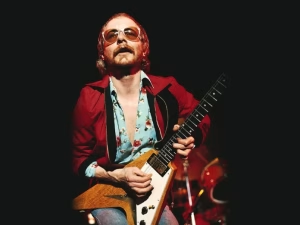 Is it true that the album cover of “Argus” also influenced the creation of Darth Vader from the Star Wars?
Is it true that the album cover of “Argus” also influenced the creation of Darth Vader from the Star Wars?
People say it’s a big coincidence. I mean, we know for a fact that movie directors and art departments are music fans like anyone else and these iconic images are powerful. Don’t forget back in those days we only had an album, we didn’t have access to all these influences. So, if you were a director and you had a Yes album in your collection and you were gonna do a movie called “Avatar” (2009), maybe you might think those Roger Dean images and thought: “That’s a cool image”. And it’s the same thing with Darth Vader. I’m pretty sure that that idea came from “Argus”. I’m pretty sure of it.
Does the first “Live Dates” (1973) album capture the true spirit of a concert by the original line up?
I think it does, yeah. We recorded everything on two multi-track machines in an old-fashioned way, in a recording truck, The Rolling Stones Mobile Studio, it was one of only a few recording trucks and that is now in the Rock Museum in Calgary, Canada and they discovered it in Moscow and we saw it. I went there not so long ago and it’s there preserved like a time capsule, a museum piece. We recorded an entire tour, so, we were able to get multiple versions of a song like, say, “Throw Down the Sword” or any song that we played on that tour and we were able to truly pick the best versions. So, I think, yeah, it’s a very good example of a band at its peak on a tour and it’s a very carefully put together album.
Could you describe to us the amazing chemistry you had with Ted Turner on twin lead guitars?
Ted and I, we were really great together because he had a natural bluesiness in his style and he was a very emotional player. A lot of times, he didn’t know what he was doing, he just played from the heart and I also like to play from the heart but, I was perhaps a bit more speedy player. I think both of us shared this love for blues and this way of pulling the emotion out into fingers and that was our chemistry and our bond and so, as a result we didn’t have any competition as guitar players. I might have been a little more proficient, but he probably was more emotional than I was. My emotion was often very excitable and frenetic type of playing and his emotion was more dreamy and whimsical kind of playing and I think that’s why we mixed so well. We had different guitar sounds, as well. We were very conscious of if he would play Stratocaster on a song, I would play a Gibson. So, technically we were very aware of always having a personality in the guitar sounds on the recordings. That was a great thing about he and I: There was never any competition, there was just mutual respect and I think that was wonderful.
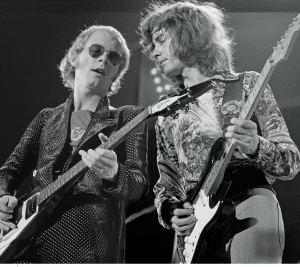 How important was the contribution of producer Derek Lawrence (Deep Purple, Jethro Tull) to the success of Wishbone Ash?
How important was the contribution of producer Derek Lawrence (Deep Purple, Jethro Tull) to the success of Wishbone Ash?
Very-very important, because as is the case for many bands, egos come to the fore. When you get a little bit of success you think: “Oh, I’m great, I’m the guy who wrote this song. I did this, I did that” and Derek was able to stop that immediately. In the studio he produced what we called a “level playing field”. So, it was like you bring the ideas to the studio and first and foremost is a band, that’s the most important thing, and bands at that time were very-very important. There weren’t a lot of solo artists; bands ruled, you know, so, it was very-very important to keep the band spirit and the “all for one” attitude and that’s what Derek did. He was able to dissipate the tension and just create a level thing, so that no one member would stand above the parapet. He also had a very good ear in terms of getting the groove right for a song. Like you might do five takes of a song and he would always say: “That’s the one” and we said: “Oh, no. Can we do one more?” and he said: “No, no. That captures the feeling that we were looking for”. We said: “Yeah, but it speeds up a little bit in the end” and he said: “No, it doesn’t matter. The spirit is there”. You must remember this is the days before digital tuners and drum machines. It was all to build the feeling, that was important to Derek and I miss him greatly. He was a really good producer.
How much has your approach to guitar changed over the years?
Not a great deal, to be honest with you. I still play some of the same licks I played when I was starting out, they came out of my mind. I’m technically more proficient now. When I first started, I just played with a pick, but now I play with a pick and fingers and I’m a better picker and I’m more rhythmic than I used to be. But I think the fluidity is the same and the emotion is the same. For example, when I go in the studio, a lot of guitar players will map out in their mind or even or record or write down how they are gonna play a solo. I never do that (laughs). Maybe because I’m lazy, I don’t know, but I think more the reason is that I rely on how the music is hitting me and then I just wanna go for it. I ‘m playing something emotional as it comes from inside me and mostly I transcend, I don’t really know what I’m doing at the time and when I listen back I go: “Oh, that’s really good. I think I could explore that route a little bit more”, so, I might do a couple of more takes, but often not. Often, I capture the feeling as I already described with Derek: It’s spontaneous.
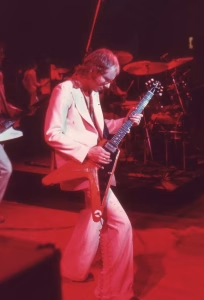 John Wetton (King Crimson, Asia -bass, vocals) had said that you turned down his song “Here Comes the Feeling” during “Number the Brave” (1981) sessions and he eventually recorded it on Asia debut album (1982). What really happened?
John Wetton (King Crimson, Asia -bass, vocals) had said that you turned down his song “Here Comes the Feeling” during “Number the Brave” (1981) sessions and he eventually recorded it on Asia debut album (1982). What really happened?
Personally, I don’t remember that song title, but what really happened was: John was suggested for the band. I knew John Wetton’s playing and I thought it was incredible, I still think it; on the bass, he was incredible. He grew up in the same town as our manager at that time, a guy called John Sherry, and they both grew up in Bournemouth, England. So, we were talking about replacing Martin Turner. When Martin left the band, we needed a new guy and what better guy in the same genre, the bass-playing style, than John Wetton and I said: “Yes, let’s bring him along”. So, he came to my house, we had a jam, some rehearsals together and he was just playing bass and he was incredible. I thought: “Man, this guy can play anything!” and he’s got that English bass sound, which was similar to Martin Turner’s sound, but more aggressive, actually. Then, we went to Miami to record with Nigel Gray (The Police, Godley & Creme producer). John said: “Yes, I can play bass”, but every day he would come in and start playing piano. He was playing these ballads and they were very keyboard-oriented and he would sing ideas and we were like: “Hmm, we are a guitar band, man. This piano? No!” (laughs) I couldn’t hear it and also the lyrics to me sounded very AOR. So, both Laurie (ed: Wisefield -guitars, vocals) and I were like: “Yeah, but can you play something on the bass?” and so he did.
He did this song “That’s That”, which he wrote it in about two minutes. It was a really aggressive song saying basically: “We ‘ve got a relationship here, but it’s over now and that’s that. It’s finished” and it was not a very pleasant song, to be honest with you. I think he was very disappointed by what it had been promised to him by the manager, that he would be the songwriting guru of Wishbone Ash. We had already written half the songs on the album, we knew the style we wanted to be, we knew it was gonna be guitar-guitar-guitar. So, John found himself feeling let down, that’s the truth. I think he already had in mind that he wanted to form another band and he went off and formed Asia and they had a #1 hit with “Heat of the Moment” (1982). I didn’t for one minute think that that was the kind of music that we would have gone on to produce, which it wasn’t. I mean, good luck to him, he did what he wanted to do, which was to make a lot of money playing radio-friendly songs. I think he thought that Wishbone Ash would be a great vehicle and he could be perhaps the leader of the band. I don’t know, I really don’t know, he has passed away now. Unfortunately, he is not with us, so, I can’t ask him, but those were the things that I thought afterwards. Certainly, the keyboard side of John Wetton just wasn’t really appropriate, at all. So, I understand his frustration. It’s a combination of business and a combination of the ideas he had that just weren’t really in tune with the ideas of the rest of the band and that’s all I can tell you.
What are your thoughts today about the reunion of the original line up in 1987?
I thought it was a pretty good idea. It was the idea of Miles Copeland (The Police manager), he was our original manager and he was the only guy that could actually make that happen. I thought it was odd, he produced the reunion of several bands like that, at that time, but he produced all those records which were instrumental records, which was a strange way for Wishbone Ash to get together. I think it was more about the idea of producing a series of instrumental records and we truly wrote an instrumental record, which was called “Nouveau Calls” (1987) and it was a good record. But I think a better plan would have been to make the thing a proper reunion, so, the first album would have been an album with songs. If we had taken the ideas that appeared on the instrumental album “Nouveau Calls” and we had made those into songs with lyrics, some of them actually were. I had a couple of songs that were complete with lyrics, they became something else; Martin Turner did. It was a great opportunity for the combination of Martin Turner and myself to make music again, but I think it was an opportunity that squandered by doing just an instrumental album. So, the reunion was great. On a personal level, we all got on well and we had grown and we all had done lots of other things, so, it was a nice thing to do. But I don’t think it delivered on the promise that was made.
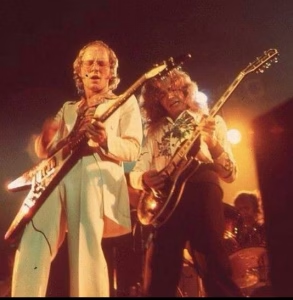 Did you feel a lot of pressure in 1993 when you decided to continue the band without any other original member?
Did you feel a lot of pressure in 1993 when you decided to continue the band without any other original member?
No, because it was already devolving. I felt pressure in the same way I felt after we had done the disastrous “Locked In” (1976) album when I suggested we get together in the country and produce the record us, on our own, “New England” (1976) and stop listening to other people telling us what to do. So, in that sense there was some pressure. But I think at that point we had done three albums, Ted Turner was gonna go back to Los Angeles, Martin Turner wasn’t particularly inspired by it. I was energized, I didn’t necessarily have a lot of ideas musically, but I was very energized as a person to carry on. So, I didn’t feel that that energy came from pressure, particularly. I just knew that the band had an amazing audience, an amazing name and an incredible brand and you couldn’t be casual about it, so, my next thing was to move the operation and bring in Americans. Americans are more tuned into this kind of thing and it proved to be a very good move because we did an album called “Illuminations” (1996) and there the band became completely American (laughs), which was very strange. Of course, don’t forget that we had all been living in America, I lived in America. So, I think the album was very good. I did two things: I involved the fans, the fan community and we did one of the first crowdfunded albums ever, there was no crowdfunding in those days, so, the album was produced by the fans. They put up money to make the album, which was amazing and we tried to look at the band’s musical style and do a very polished album. I remember going to London and going to visit Martin Turner and we played him the album, Roger Filgate, the other guitar player and myself and he was a little bit disparaging. He said: “Oh, it sounds like a very posh-sounding record”, in other words, it was too polished (laughs). Yeah, it was a very great record, but of course it didn’t do anything in the charts, so, it had no promotion because we only had a small record label. But it was very personally rewarding to produce such a great album.
How did you get to record with George Harrison and Ringo Starr?
Well, you are going back in time now. In the early days, we would rehearse in the basement of our manager’s house, in St John’s Wood, London and this basement was a very-very famous basement, a lot of band had been in that basement and rehearsed and recorded. We would go there every day, sometimes 12 hours a day and this is what contributed to the amazing band spirit of the early band, because we lived, we ate, we breathed music together, in that basement. At the end of the day, we had a couple of people around us like road managers, publicists, people that were friendly with other bands. We had a road manager and a friend, the road manager’s name was Kevin Harrington and our friend at the time was a guy called Rod Lynton (vocals, guitar), who was in a band called Rupert’s People and they were both hanging around at Apple Studios a lot, as well, they were working there. So, The Beatles were in the process of breaking up and recording their own music and one day someone came down the studio and said: “Quickly, George Harrison is recording with Cilla Black and they need a guitar player. Can you do it, Andy?” and I said: “Sure. Yeah, I’ll do it” and I went down there and I recorded with George and Ringo and Klaus Voormann on bass. It was amazing, you know, and Cilla Black was singing (laughs).
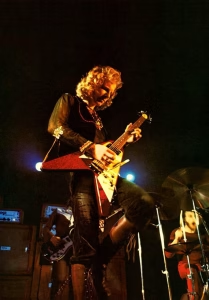 The thing is before that, they came down the studio and said: “Will anyone be available playing on a record with John Lennon?” and I said: “Yeah, but I’m really tired, we are rehearsing all day” and Ted Turner put his hand up and said: “I’ll go”. So, he ended up on the album “Imagine” (1971). He didn’t know it was gonna be “Imagine”. It was great working with those guys. The thing I remember about George Harrison and Ringo was, they were so humble. I mean, George Harrison is a fantastic guitar player, he ‘s played all these amazing melodies and played with The Beatles and everybody loves George Harrison’s playing and his songs, but he was all: “No, you are the real guitar player. I just play rhythm”. I said: “Come on”, really. Ringo was the same: Very modest, you know. I think they realised there was a new breed of musicians coming up that were different, it was rock as opposed to rock ’n’ roll and they were a little bit, in their own way, intimidated, even though they were with The Beatles (laughs). So, it was really funny. Subsequently, I went out to Ringo’s house and I did another session out there, at Tittenhurst Park (ed: previously owned by John Lennon, he filmed “Imagine” video there) and he was on drums. It was great. It was amazing time to be in London because when we were rehearsing in St John’s Wood, Paul McCartney had a house just up on the corner, so, I’d see him out walking with his dogs. The Beatles were all around London, the music, the people and you could have access to them. You ‘d go down to the Speakeasy club and maybe one of The Beatles would be there or anyone of the other bands that were very popular in England at the time.
The thing is before that, they came down the studio and said: “Will anyone be available playing on a record with John Lennon?” and I said: “Yeah, but I’m really tired, we are rehearsing all day” and Ted Turner put his hand up and said: “I’ll go”. So, he ended up on the album “Imagine” (1971). He didn’t know it was gonna be “Imagine”. It was great working with those guys. The thing I remember about George Harrison and Ringo was, they were so humble. I mean, George Harrison is a fantastic guitar player, he ‘s played all these amazing melodies and played with The Beatles and everybody loves George Harrison’s playing and his songs, but he was all: “No, you are the real guitar player. I just play rhythm”. I said: “Come on”, really. Ringo was the same: Very modest, you know. I think they realised there was a new breed of musicians coming up that were different, it was rock as opposed to rock ’n’ roll and they were a little bit, in their own way, intimidated, even though they were with The Beatles (laughs). So, it was really funny. Subsequently, I went out to Ringo’s house and I did another session out there, at Tittenhurst Park (ed: previously owned by John Lennon, he filmed “Imagine” video there) and he was on drums. It was great. It was amazing time to be in London because when we were rehearsing in St John’s Wood, Paul McCartney had a house just up on the corner, so, I’d see him out walking with his dogs. The Beatles were all around London, the music, the people and you could have access to them. You ‘d go down to the Speakeasy club and maybe one of The Beatles would be there or anyone of the other bands that were very popular in England at the time.
How did you start using a Flying V?
Well, that story is well-known. I went to buy some Orange equipment, this stuff (ed: he shows a small Orange amplifier on Zoom). We needed powerful, big equipment for America and I went to this shop and there were those two Flying V’s on the wall. I had never held a Flying V before and before I plugged it in I thought: “This seems so amazing”. It’s a very vibrant guitar. I plugged it into the amplifier and it sounded incredible and then I said: “How much does that guitar cost?” and they said: “£300”. I said: “I’ll take it, it’s incredible. I ‘d like to play it” and I took it back to my tiny little flat in London and I put it on a chair at the end of the bed and I lied on the bed and I said: “That’s my guitar. I think that’s gonna be my guitar” and from that moment on I never put it down.
A huge “THANK YOU” to Mr. Andy Powell for his time. I should also thank Mr. Andy Nye for his valuable help.
Official Wishbone Ash website: https://www.wishboneashofficial.com/
Official Wishbone Ash Facebook page: https://www.facebook.com/wishbone.ash.official

